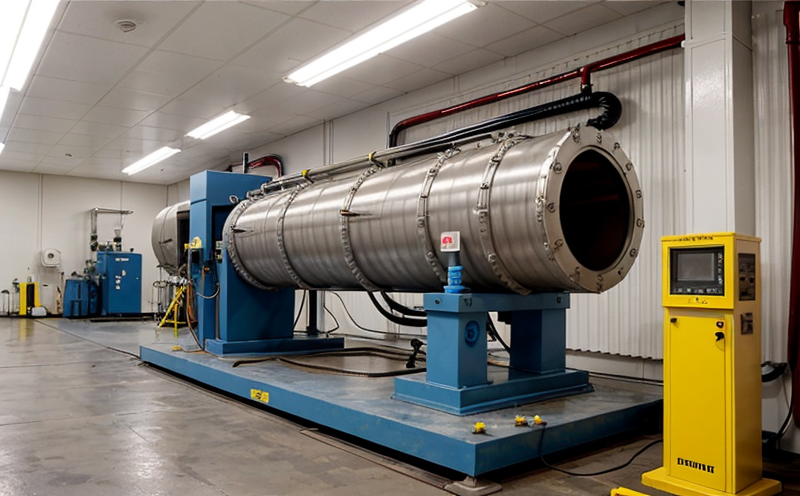ISO 11650 Testing of Uranium Compounds for Fuel Cycle
The ISO 11650 standard provides a comprehensive framework for the testing and evaluation of uranium compounds used in nuclear fuel cycles. This standard ensures that these materials meet stringent quality and safety criteria, which are critical for both reactor operation and non-proliferation efforts.
Uranium, as one of the key elements in the global nuclear fuel cycle, plays a pivotal role in generating electricity through nuclear power plants. The integrity and purity of uranium compounds directly impact reactor performance, operational efficiency, safety, and regulatory compliance. Testing these materials according to ISO 11650 ensures that they are suitable for their intended applications.
The testing protocol specified by ISO 11650 includes a series of analytical methods aimed at assessing the chemical composition, physical properties, and potential impurities in uranium compounds. This process helps identify any deviations from the expected specifications, which could lead to operational issues or safety hazards if not addressed.
Specifically, this standard covers tests for:
- Chemical purity
- Metallic content (e.g., thorium and plutonium)
- Purity of uranium oxide (UO2)
- Presence of impurities such as oxygen, nitrogen, carbon, and metallic elements
The testing methods used in compliance with ISO 11650 involve advanced analytical techniques like inductively coupled plasma mass spectrometry (ICP-MS), X-ray fluorescence spectroscopy (XRF), and scanning electron microscopy-energy dispersive X-ray analysis (SEM-EDAX). These instruments provide precise measurements necessary for meeting the stringent requirements set forth by this international standard.
Compliance with ISO 11650 is mandatory in many countries due to its rigorous approach to ensuring nuclear materials are safe and reliable. Companies involved in the production, processing, or utilization of uranium compounds must adhere to these standards to maintain their operations legally and efficiently.
The importance of this testing cannot be overstated given the global push towards sustainable energy solutions while maintaining robust safety measures. By adhering to ISO 11650 guidelines, organizations can ensure they are meeting not only regulatory requirements but also contributing positively to environmental protection efforts.
Why It Matters
The importance of ISO 11650 testing extends beyond mere compliance—it represents a commitment to excellence in nuclear fuel production and safety. Ensuring that uranium compounds meet the highest standards is crucial for several reasons:
- Operational Efficiency: Purity guarantees optimal performance within reactor systems, reducing maintenance costs and extending service life.
- Safety: Minimizing impurities helps prevent unwanted reactions that could compromise reactor integrity or pose radiation risks.
- Regulatory Compliance: Meeting international standards like ISO 11650 is essential for maintaining access to global markets and ensuring alignment with international agreements.
- Ethical Responsibility: By adhering to these stringent tests, companies contribute to the responsible use of nuclear technology in generating clean energy.
In summary, ISO 11650 testing is not just a procedural necessity but an integral part of maintaining high standards in nuclear fuel production and safety.
Why Choose This Test
- Global Recognition: Adherence to ISO 11650 ensures that your products meet international quality benchmarks, enhancing market credibility.
- Precision and Reliability: Advanced analytical methods used in testing provide accurate results, ensuring consistent product quality.
- Regulatory Compliance: This test aligns with global regulations, helping you avoid costly penalties or delays due to non-compliance.
- Safety Assurance: By identifying potential hazards early on, this testing contributes significantly to operational safety and security.
Choosing ISO 11650 testing means investing in a robust quality assurance process that supports long-term success in the nuclear fuel industry.
Customer Impact and Satisfaction
The impact of adhering to ISO 11650 standards on both customers and suppliers is profound. For customers, purchasing uranium compounds tested according to this standard offers peace of mind knowing they are receiving reliable, high-quality materials.
Supplier satisfaction also benefits from implementing these tests as it demonstrates a commitment to excellence, leading to stronger business relationships and potentially greater market share. Additionally, compliance with such stringent standards enhances brand reputation, fostering trust among stakeholders.
In summary, ISO 11650 testing plays an essential role in building customer confidence and supplier reliability within the nuclear fuel industry.





